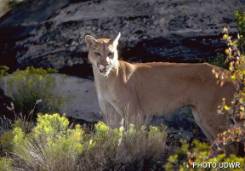Ask an Expert – Cougar Sightings on the Rise
In recent weeks, reports of cougar sightings have increased across Utah, including in urban areas. The cougar, Puma concolor, is known as the mountain lion, puma, screamer or panther. They are readily recognized by their tawny color, white muzzle and long tail.
Adults typically weigh 90-200 pounds. Males and females pair briefly for breeding, but the female raises the kittens alone. Kittens stay with the female until they are about a year and a half old, at which time they disperse to find their own territories.
The cougar has been a protected wildlife species in Utah since 1967. The Utah Division of Wildlife Resources manages an annual statewide limited-entry hunting season on cougars in Utah to regulate populations and reduce the potential for human-wildlife conflicts.
Although cougars are found across Utah, they are solitary animals, making them a rare sight for humans. Cougars can be found from the High Uinta wilderness to the dry southern deserts. In Utah, cougars prefer more wooded areas such as pinyon-juniper and pine-oak brush areas. Within these habitat types, they prefer areas where there are rocky cliffs, ledges and tall trees or brush that can be used for cover.
The main prey of cougars is deer, so they will be found wherever deer are. They will also eat elk, antelope, small mammals and birds. They usually hunt alone and at night, ambushing their prey from behind. Typically, cougars kill their prey with a bite to the lower neck.
After making a kill, a cougar often will take the carcass to the base of a tree and cover it with soil, leaves or snow, saving it to feed on later.
Living in cougar country requires awareness and adjustments. Consider these tips.
Secure your property
* Remove wildlife attractants from your property, including pet food, water sources, bird feeders and fallen fruit.
* Make your yard deer-proof. If your property and landscaping are attractive to deer and other wildlife, cougars may follow the wildlife into your property while searching for prey and stay close by.
* Trim vegetation and remove woodpiles to reduce hiding places for wildlife.
* Install outside and motion sensitive lighting around your property.
* Do not leave children outside unattended, especially at dawn and dusk.
* Bring pets and livestock inside at night or secure them in a barn or kennel with a top.
* Provide secure shelter for hobby farm animals such as poultry, rabbits and goats.
* Invite your neighbors to follow these tips too.
Prevent Conflicts While Recreating
* Cougars rarely bother groups of people. Therefore, travel in groups, and keep everyone together, including children and dogs. Keep dogs on leashes. Do not hike or jog alone.
* Make noise while hiking to alert cougars of your presence.
* Leave the area if you find a dead animal, especially deer or elk, as it could be a cougar kill. The cougar may return and defend its food.
* Keep a clean camp. Store food and garbage in an odor-free, locked container or hung between two trees where cougars (and bears) cannot get it.
If You Encounter A Cougar
It is unusual to see cougars in the wild, and they rarely cause problems for humans. Although unlikely to happen, you should know how to react if you encounter an aggressive cougar.
* Stop. Never run from a cougar. Running will provoke an instinctive prey response and the cougar may pursue you.
* Do not approach the cougar.
* Make yourself look intimidating. Make eye contact with the cougar, which cougars consider a threat. Make yourself look big by opening your jacket, raising your arms and waving them.
* Stand up tall. Do not crouch or squat.
* Talk firmly in a loud voice, back away slowly and leave the area.
* If you have children with you, pick them up before they panic and run. As you pick them up, keep eye contact with the cougar and try not to bend over too far or turn your back to the cougar.
* If attacked, fight back! Protect your head and neck, as the neck is the target for the cougar. If you are aggressive enough, the cougar may think it is not likely to win its fight with you quickly, and it will probably give up and leave.
If you have an encounter with aggressive wildlife, please alert the Utah Division of Wildlife Resources office near you. If the encounter or sighting occurs after hours or on the weekend, call your local police department or county sheriff’s office, who can then contact a conservation officer to handle the situation. More information is available at https://www.wildawareutah.org/. ******
See video at https://www.youtube.com/watch?v=qwQ_a3BJhnQ
By: Terry Messmer, Utah State University Extension wildlife specialist, terry.messmer@usu.edu, 435-797-3975


 Utah 4-H & Youth
Utah 4-H & Youth